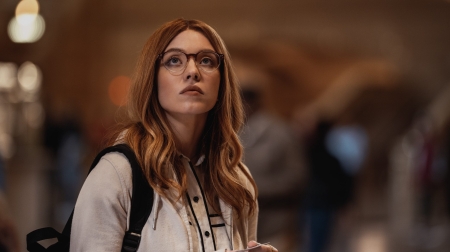In 2007, Adrienne Shelly’s Waitress premiered at the Sundance Film Festival, only three months after her untimely death. Over a decade later, her story not only lives on but has made its way back to a film festival, though in a slightly different form. In 2016, the film became a hit Broadway musical with songs from pop superstar Sara Bareilles, who even went on to star in the show.
Though mixed with critics, it garnered a fervent fanbase that kept coming back for more – the show played over 1,500 performances in New York, inspired multiple international transfers, and even merited the rare opportunity to be captured on film for (hopefully) wider distribution. This past week, the professional recording premiered at the Tribeca Film Festival, mere miles away from not only where the production was filmed but also where Shelly herself was last seen.
This is all to say that Waitress, The Musical – Live on Broadway! already felt like a stirring culmination before seeing a single frame. And then you actually watch the movie – a dynamically shot recreation of an already emotionally rapturous show – and it only feels more momentous.
Despite their broad appeal, Broadway productions are rarely filmed for posterity in a way that is accessible to the average theater fan. Some modern productions (She Loves Me, Falsettos, Hamilton) have gotten to live beyond their life on stage, but many don’t. For such a popular, resonant musical to have a quality recording, let alone one that doesn’t alter the material in its translation while still reinventing it cinematically, is a true gift to the theater community and Broadway lovers everywhere.
Similar to the original film, Waitress follows Jenna (Bareilles), a small-town waitress and master pie-baker that gets struck by an unplanned pregnancy. Jenna doesn’t want a child, already struggling to make ends meet alongside her abusive husband, Earl (Bareilles’ off-stage fiance Joe Tippett). However, a local pie contest with $20,000 in prize money may be her ticket out, along with an impassioned affair with her gynecologist, Dr. Pomatter (Drew Gehling in a scene-stealing comedic performance).
Jenna’s reckoning with her own agency inspires her co-workers, Dawn (Caitlin Houlahan) and Becky (Charity Angél Dawson), to similarly take their lives into their own hands. An initially humble show slowly evolves into a messy but heartfelt story about challenging oneself to find true happiness.
Fans of the musical already know what’s working: Bareilles’ infectious and soulful tunes, choreographer Lorin Latarro’s evocative movement, scenic designer Scott Pask’s lean but detailed sets, etc. However, the camera is a whole different beast; theater is an art form traditionally designed to reach the back of a ~1000 seat auditorium, but film is a medium that makes even the smallest moments up close and personal.
Thankfully, in the case of Waitress, a production with several powerful yet intimate scenes, the camera not only accentuates them but elevates them. In fact, it even helps to even out the show’s tightrope tonal walk between comedy and drama. On stage, depictions of abuse struggle to gel with a script imbued with strong comic energy. Here, handheld camerawork and close-ups on Tippett’s big blue eyes give the character of Earl a gravitas that simply can’t be conveyed in the nosebleeds.
Though it certainly isn’t challenging the form, Waitress does utilize a number of cinematic techniques to add new dimension to specific scenes: slow motion, superimposition, and even the occasional unbroken long take. Having both the language of cinema and theater coalesce in this way is a treat for fans of both mediums, but never distracts to the point that any person in one camp may be confused by the other.
Additionally, there are several moments of strong camera coverage that add new dimensions to the performances. Bareilles’ turn as Jenna is made even more captivating with time to breathe from shot to shot, but it may be Dawson’s showstopping performance of “I Didn’t Plan It” that is the most rousing. It’s a close-up crystallization of not only her exuberant physicality as Becky but also her impeccable vocals from riff to riff.
The genre of live capture exists in a strange ether between artistic filmmaking and documentation. It’s hard to surmise that a recording of a musical can be defined in the same category as a filmic narrative built from the ground up. That being said, any film that uses the techniques of cinema to inspire as much emotion as Waitress does deserves recognition amongst its peers. Waitress is not a full blend of the two mediums but a strong step forward in suggesting there can be one, as the production is unquestionably made stronger in this new medium without being stripped of the charm and passion it was imbued with from the beginning. May many more musicals follow its example and promptly.
‘Waitress, The Musical – Live on Broadway!’ held its World Premiere as part of the Spotlight+ section at the 2023 Tribeca Festival. It is currently seeking distribution.
'Waitress, The Musical - Live on Broadway!' uses the language of cinema to elevate an already charming and emotionally heartfelt musical.
- GVN Rating 9
-
User Ratings (1 Votes)
10

Larry Fried is a filmmaker, writer, and podcaster based in New Jersey. He is the host and creator of the podcast “My Favorite Movie is…,” a podcast dedicated to helping filmmakers make somebody’s next favorite movie. He is also the Visual Content Manager for Special Olympics New Jersey, an organization dedicated to competition and training opportunities for athletes with intellectual disabilities across the Garden State.







